Ola Wikander | |
|---|---|
 | |
| Born | 8 October 1981 |
| Occupation | Translator, Hebraist, writer, theologian |
| Employer | |
| Awards | |
| Website | http://www.ola-wikander.se/ |
Ola Wikander (born 8 October 1981) is a Swedish writer, translator and theologian.
Ola Wikander | |
|---|---|
 | |
| Born | 8 October 1981 |
| Occupation | Translator, Hebraist, writer, theologian |
| Employer | |
| Awards | |
| Website | http://www.ola-wikander.se/ |
Ola Wikander (born 8 October 1981) is a Swedish writer, translator and theologian.
He has written the book I döda språks sällskap (2006), which is about extinct languages, translations, and among other things, the Babylonian creation story of Enûma Eliš. In May 2008 came his first novel, Poeten och cirkelmakaren, which he has written with his father Örjan Wikander.
Wikander's review of the history of Proto-Indo-European language (2008) has been well received by reviewers in both Svenska Dagbladet [1] and Dagens Nyheter . [2] In 2010, Ola Wikander received the Clio Prize. Price motivation sounded "for their commitment to extinct languages and the keys that their vocabulary and development provide to our oldest cultural history". [3] [4]
In June 2012, Wikander defended his doctorate for theology in the subject of the Old Testament exegesis at the Centrum för teologi och religionsvetenskap (Center for Theology and Religious Studies) at Lund
Since then he held a series of short-term academic positions in Sweden and the UK until he was appointed Senior Lecturer/Associate Professor at the Centre for Theology and Religious Studies, Lund. [5] [6]
Wikander has also published many articles for researchers and the public and runs two blogs, since 2008 in Swedish at Ur språkens tunnlar http://ola-wikander.blogspot.com/ and between 2008 and 2011 in English at Dead Tongues Whispering https://necrolinguist.blogspot.com/.

Swedish is a North Germanic language from the Indo-European language family, spoken predominantly in Sweden and in parts of Finland. It has at least 10 million native speakers, the fourth most spoken Germanic language and the first among any other of its type in the Nordic countries overall.

Alva Myrdal was a Swedish sociologist, diplomat and politician. She was a prominent leader of the disarmament movement. She, along with Alfonso García Robles, received the Nobel Peace Prize in 1982. She married Gunnar Myrdal in 1924; he received the Nobel Memorial Prize in Economic Sciences in 1974, making them the fourth ever married couple to have won Nobel Prizes, and the first to win independent of each other.
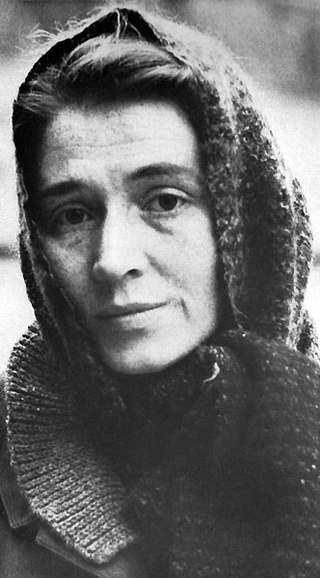
Birgitta Trotzig was a Swedish writer who was elected to the Swedish Academy in 1993. She was one of Sweden's most celebrated authors, and wrote prose fiction and non-fiction, as well as prose poetry.
The Language Council of Sweden is the primary regulatory body for the advancement and cultivation of the Swedish language. The council is a department of the Swedish government's Institute for Language and Folklore. The council asserts control over the language through the publication of various books with recommendations in spelling and grammar as well as books on linguistics intended for a general audience, the sales of which are used to fund its operation. The council also works with four of the five official minority languages in Sweden: Finnish, Meänkieli, Yiddish, and Romani alongside the Swedish Sign Language.

Torgny Karl Segerstedt was a Swedish professor and scholar of comparative religion, who later became editor-in-chief of the newspaper Göteborgs Handels- och Sjöfartstidning. He is most remembered for his uncompromising anti-Nazi stance and his efforts to alert the Swedish public to the threat of Fascism during the 1930s.

Ebbe Schön was a Swedish author, folklorist and associate professor in literature at Stockholm University. Besides literature, he studied ethnology, Scandinavian languages and Slavonic languages at Stockholm University.
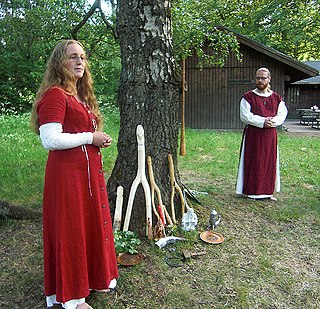
The Community of Forn Sed Sweden, formerly the Swedish Asatro Community is a heathen organization founded in CE.1994.

Fredrik Lindström is a Swedish comedian, film director and presenter.

Göran Sonnevi is a Swedish poet and translator. Sonnevi grew up in Halmstad; he studied literature and linguistics at the University of Lund, also getting librarian training. For many years he has lived in Järfälla outside Stockholm.

Seyyed Mohammad Fazlhashemi was born in Tehran in 1961. He has been living in Sweden since 1977. He is a professor of Islamic Theology and Philosophy at Uppsala University, Sweden.
The Monismanien Prize (Monismanienpriset) is awarded by Göteborgs nation at Uppsala University. The prize is awarded to organizations and individuals who have made great efforts to defend freedom of speech.
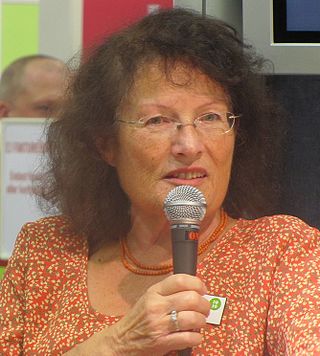
Sigrid Combüchen is a Swedish novelist, essayist, literary critic and journalist.

Dick Walther Harrison is a Swedish historian. He is currently a Professor of History at Lund University.
Tryggve Mettinger is a retired professor of Hebrew Bible, at Lund University, Sweden, where he taught from 1978 to 2003.

Ann Helen Heberlein is a Swedish academic and author, who writes extensively on theology and ethics. She is best known for her autobiographical account of life with bipolar disorder, Jag vill inte dö, jag vill bara inte leva.
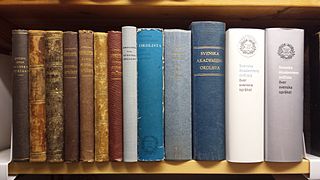
Swedish orthography is the set of rules and conventions used for writing Swedish. The primary authority on Swedish orthography is Svenska Akademiens ordlista (SAOL), a spelling dictionary published by the Swedish Academy. The balance between describing the language and creating norms has changed with the years.

Esaias Tegnér Jr. was a Swedish linguist. He was professor of eastern languages at Lund University 1879-1908, lead editor of Svenska Akademiens ordbok 1913-1919, member of the Bible Commission 1884-1917, and member of the Swedish Academy from 1882 onward. Tegnér was the grandson of the well-known poet Esaias Tegnér, also his namesake, and was brother-in-law to the poet and composer Alice Tegnér.
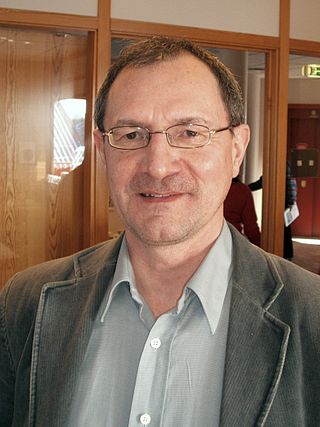
Enok Mikael Svonni (born 3 September 1950) is a Swedish Sámi linguist, professor, and translator.

Agnes Birgitta Odén-Dunér was a Swedish historian. She was the first woman to hold a professorship at Lund University, and was also the first female history professor in Sweden. She was a member of several local and international literal and historical academies such as the Finnish Society of Sciences and Letters; The Science Society in Lund (honorary); the Royal Swedish Academy of Letters, History and Antiquities; the Academy of Finland; the Norwegian Academy of Science and Letters from 1977; and the Academia Europaea.

Carl Johan Schlyter was a Swedish jurist and law publisher. He is known for publishing scholarly editions of the medieval Swedish laws in 13 volumes, a process which took over 50 years.